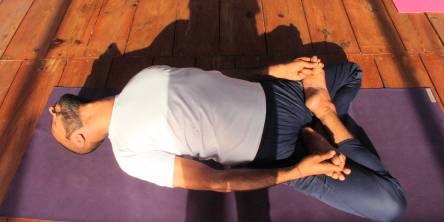How to Increase Back Flexibility Through Yoga Exercise?
Yoga is an ancient health care system and works on the overall well being. Yoga works greatly on treating a variety of ailments, both internal or external. Likewise, this therapeutic practice helps you to have a flexible back and prevent back injuries, pain, and balance issues. With the help of yoga asanas, you enable to stretch the body and can achieve mobility and a full range of motion easily.
Here are five amazing yoga asana to get a limber spine.
Dhanurasana (Bow Pose)
Steps:
• Lie flat on your stomach on the ground and bend the legs backward.
• Now stretch the arms towards the back and try to hold the ankles.
• Your body’s entire weight comes on the abdomen.
• Breathe slowly and hold the pose for at least 30 seconds.
Eka Pada Rajakapotasana (One-Legged King Pigeon Pose)
Steps:
• Get on your four limbs like you do in Marjaryasana.
• Your knees should be below your hips and hands should be slightly ahead of the shoulders.
• Now move the left knee forward near the left wrist, and at the same time place the left shin under the torso.
• Now bring the left foot in front of the right knee and let the shin rest on the floor.
• Now slide the right leg towards the back, strengthen the knee and press the thigh into the floor.
• Place the left heel in front of the right.
• Your right leg should be straight and now, roll it inward and let the midline presses against the floor.
• Stretch your arms forward, and then take the right hand towards the back and place the left hand on the floor.
• Hold the right foot with the right hand and stay in the pose for 30-60 seconds.
• Release the pose slowly. Return to the starting position and then repeat the same with the other side.
Setu Bandha Sarvangasana (Bridge Pose)
Steps:
• Lie flat on your back on the ground.
• Now bend your knees with the feet lying flat on the ground. Press your arms on the ground, and lift the hips up and back from the ground.
• Now lift up the upper back and support the back area with the hands, neck, and shoulders.
• Hold the pose for at least 30 seconds.
Ardha Bhekasana (Half Frog Pose)
Steps:
• Lie flat on your stomach and press the arms on the floor.
• Now lift up your head and upper torso. Then bend your left knee and bring the left heel towards the left hip.
• Now support the frame on the right forearms and take your left hand back and hold the left foot.
• Now slowly rotate the elbow toward the ceiling and slide the fingers over the foot-top and place it above the toe tips.
• Press the foot with the palm. Now slowly try to press the foot towards the floor as much as you can.
• Keep the hip and knee in line and don’t strain your leg or hurt your knee.
• Lift the chest, and hold the pose for 30 seconds.
• Release, return to the starting point and repeat the same on the other side.
Uttanasana (Standing Forward Bend)
Steps:
• Stand straight on the ground with your feet together and hands on the side.
• Take a deep breath and bend your upper body forward from your hips.
• Try to touch your feet or place the hands on the floor. You can also fold your arms in front of you.
• Keep the knees straight and at a distance from the torso.
• Let your neck and head hang in the air, but do not stress it. Hold the pose for 30-40 seconds.
Dean Walker said that a strong, more flexible body will tolerate a fall better.
Indeed a flexible body prevents injury and pain. It also improves the posture. And a good body balance and posture add to the amazing and attractive physical personality.


